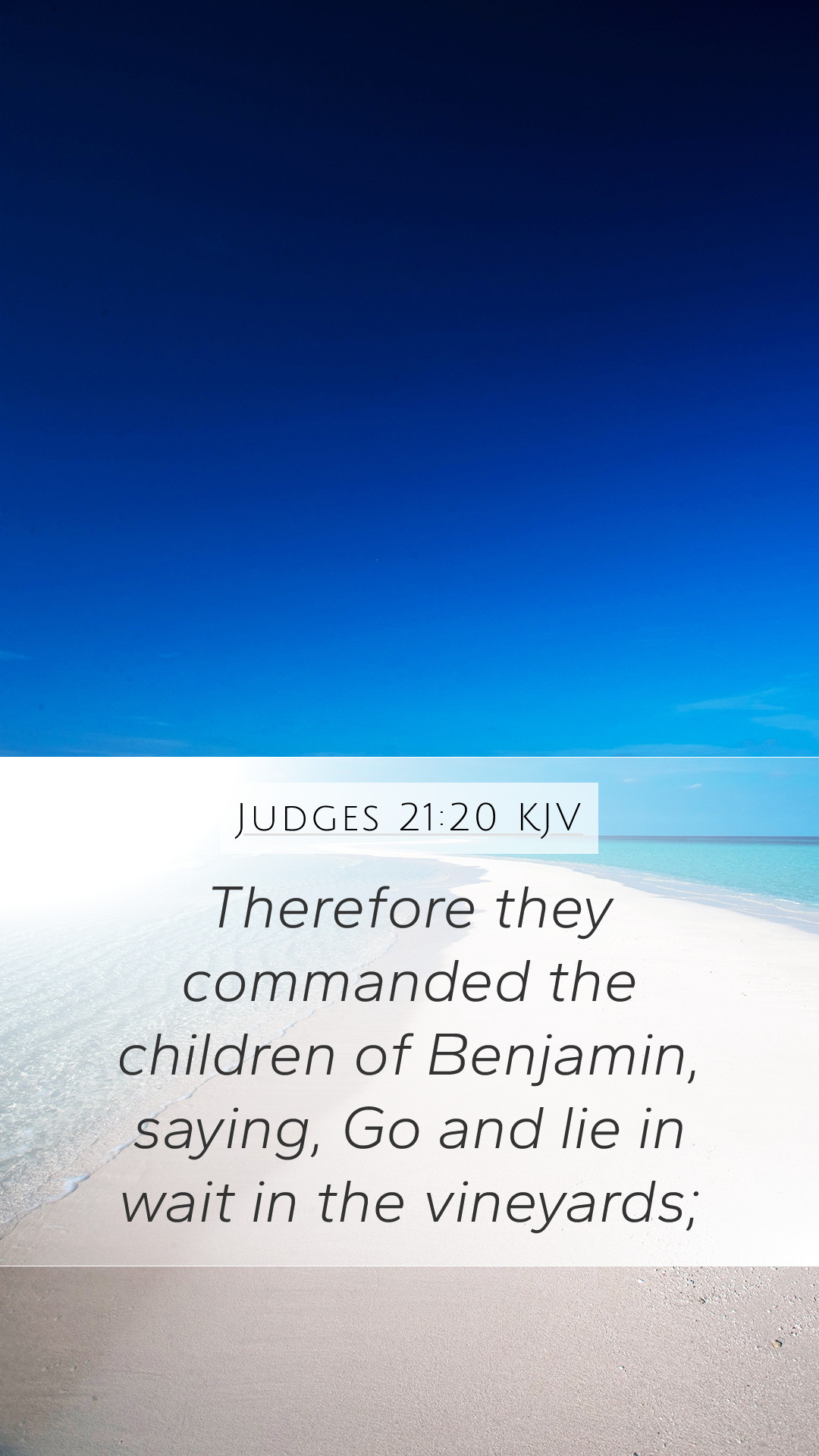Bible Verse Commentary: Judges 21:20
In Judges 21:20, we find dire circumstances following the moral and social decay reflected throughout the book of Judges. The verse reads: "Therefore they commanded the children of Benjamin, saying, 'Go and lie in wait in the vineyards.' This command reflects the desperate situation of the Israelite tribes as they sought to pacify the conflict between the tribe of Benjamin and the other tribes of Israel.
Understanding Scripture
From the public domain commentaries of Matthew Henry, Albert Barnes, and Adam Clarke, we can gather a deeper understanding of this verse.
Context and Background
The events leading up to this verse involve a civil war in Israel, where the tribe of Benjamin becomes isolated due to its sins and refusal to surrender the perpetrators of heinous crimes. The other tribes come together against Benjamin, resulting in devastating losses and rare situations of survival.
Bible Verse Interpretations
-
Matthew Henry's Commentary:
Henry points out the tragic plight of the Benjaminites, noting how they were almost entirely wiped out and that this command to lie in wait symbolizes the need for cunning and strategy in warfare. It suggests a strategic maneuvering employed by the other tribes while also displaying the moral decline of Israel that leads them to such drastic actions.
-
Albert Barnes' Notes:
Barnes emphasizes the communication from the Israelite leaders to the Benjaminites, which illustrates the tension and desperation of the situation. The phrase "lie in wait" indicates a tactical approach in a battle that reflects not only physical conflict but also moral turmoil among the tribes.
-
Adam Clarke's Commentary:
Clarke notes the context of the verse within the tragic fallout of civil strife, asserting that this verse serves a dual purpose of both military strategy and a reflection of the hopelessness faced by the Israelites. He urges readers to recognize the fallout of sin and its consequences in community life.
Biblical Exegesis
The command given to the Benjaminites to "lie in wait" can be understood through a lens of historical conflict. This phrase holds tactical significance, signifying the need for strategic positioning in war. The commentary suggests that God's providence may still be at play even when human actions are laden with moral failings.
Application of Bible Verses to Daily Life
The verse provides insight into the complications arising from communal sin and conflict. It invites reflection on how individuals and groups handle disputes, emphasizing the necessity of reconciliation and strategy in resolution. It also challenges readers to consider the moral foundations upon which they build community and relationships.
Related Bible Cross References
- Judges 20:1 - The convening of all Israel to discuss the situation with Benjamin.
- 1 Samuel 10:27 - Reflecting on the rejection of Saul as king, which parallels Israel's struggles.
- Romans 12:19 - Guidance on vengeance that mirrors the need for justice over revenge in difficult times.
Conclusion
Judges 21:20 encapsulates a narrative rife with conflict, divine justice, and the complexities of human relationships in times of strife. By engaging with commentaries from reputable sources such as Matthew Henry, Albert Barnes, and Adam Clarke, readers can derive significant insights into the nature of such biblical passages.
Further Study and Reflection
Those engaged in Bible study groups or seeking Bible study tools can use this verse for in-depth Bible verse analysis, exploring themes of conflict resolution, accountability, and community ethics within the framework of Scripture. Understanding these narratives is essential for anyone looking to deepen their Bible study insights and apply biblical teachings to daily life.


